动词表示动作形态
助动词
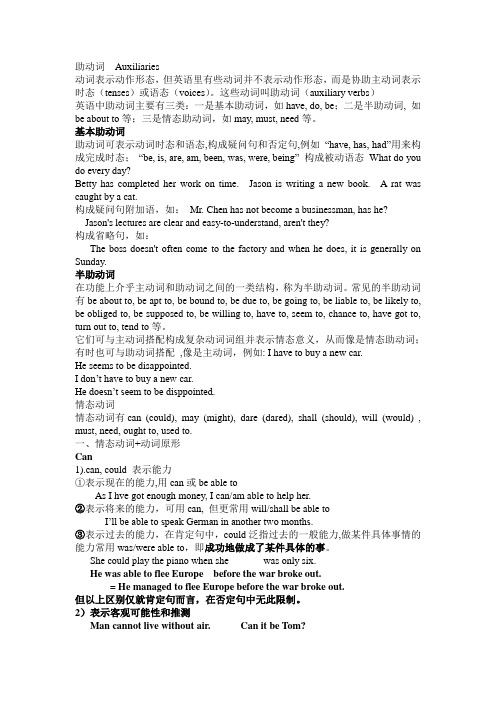
助动词Auxiliaries动词表示动作形态,但英语里有些动词并不表示动作形态,而是协助主动词表示时态(tenses)或语态(voices)。
这些动词叫助动词(auxiliary verbs)英语中助动词主要有三类:一是基本助动词,如have, do, be;二是半助动词, 如be about to等;三是情态助动词,如may, must, need等。
基本助动词助动词可表示动词时态和语态,构成疑问句和否定句,例如“have, has, had”用来构成完成时态;“be, is, are, am, been, was, were, being” 构成被动语态What do you do every day?Betty has completed her work on time. Jason is writing a new book. A rat was caught by a cat.构成疑问句附加语,如:Mr. Chen has not become a businessman, has he?Jason's lectures are clear and easy-to-understand, aren't they?构成省略句,如:The boss doesn't often come to the factory and when he does, it is generally on Sunday.半助动词在功能上介乎主动词和助动词之间的一类结构,称为半助动词。
常见的半助动词有be about to, be apt to, be bound to, be due to, be going to, be liable to, be likely to, be obliged to, be supposed to, be willing to, have to, seem to, chance to, have got to, turn out to, tend to等。
动词过去式大全表
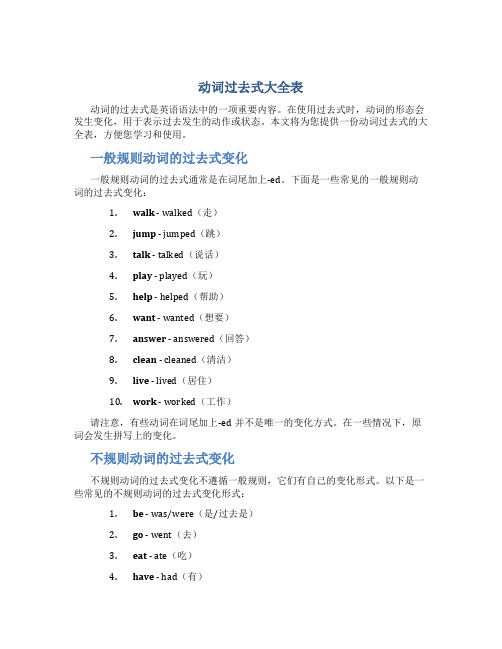
动词过去式大全表动词的过去式是英语语法中的一项重要内容。
在使用过去式时,动词的形态会发生变化,用于表示过去发生的动作或状态。
本文将为您提供一份动词过去式的大全表,方便您学习和使用。
一般规则动词的过去式变化一般规则动词的过去式通常是在词尾加上-ed。
下面是一些常见的一般规则动词的过去式变化:1.walk - walked(走)2.jump - jumped(跳)3.talk - talked(说话)4.play - played(玩)5.help - helped(帮助)6.want - wanted(想要)7.answer - answered(回答)8.clean - cleaned(清洁)9.live - lived(居住)10.work - worked(工作)请注意,有些动词在词尾加上-ed并不是唯一的变化方式。
在一些情况下,原词会发生拼写上的变化。
不规则动词的过去式变化不规则动词的过去式变化不遵循一般规则,它们有自己的变化形式。
以下是一些常见的不规则动词的过去式变化形式:1.be - was/were(是/过去是)2.go - went(去)3.eat - ate(吃)4.have - had(有)5.see - saw(看到)6.do - did(做)7.say - said(说)8.get - got(得到)9.give - gave(给予)10.make - made(制作)不规则动词的过去式变化形式是需要记忆的,所以建议您多加练习,以便熟练掌握。
特殊情况下的过去式变化除了一般规则动词和不规则动词,还有一些动词在过去时态中有特殊的变化形式。
下面是一些常见的特殊情况下的过去式变化形式:1.y结尾的动词,将y变成i,再加ed。
–study - studied(学习)–try - tried(尝试)2.双写结尾字母的动词,需在词尾加上ed。
–stop - stopped(停止)–plan - planned(计划)3.以e** 结尾的动词,只需在词尾加上d**。
日语初级动词知识点总结

日语初级动词知识点总结动词是日语中最基本的词类之一,它用来表示动作、状态、或者存在等概念。
在日语中,动词的变形非常复杂,包括词干变化、时态变化、句型变化等。
以下是日语初级动词知识点的总结,希望对初学者有所帮助。
一、动词的基本形式在日语中,动词的基本形式叫做词干形(词干原形)。
日语中的动词有五个基本形式,分别是未然形(て形)、已然形(た形)、连用形(ます形)、终止形和连体形。
每个形式都有其独特的用法和变化规则。
1. 未然形(て形)未然形通常用来表示动作的连续、并列或者原因、结果关系。
未然形的构成有规则动词和不规则动词两种情况,规则动词的未然形是将词干最后的「る」变为「て」,例如:食べる→食べて;不规则动词的未然形需要记忆,比如「行く」的未然形是「行って」、「する」的未然形是「して」等。
2. 已然形(た形)已然形通常用来表示动作已经完成。
构成规则动词的已然形是将词干最后的「る」变为「た」,例如:食べる→食べた;不规则动词的已然形需要记忆,比如「行く」的已然形是「行った」、「する」的已然形是「した」等。
3. 连用形(ます形)连用形通常用来构成各种时态、句型和语法形式。
规则动词的连用形是将词干最后的「る」变为「ます」,例如:食べる→食べます;不规则动词的连用形也需要记忆,比如「行く」的连用形是「行きます」、「する」的连用形是「します」等。
4. 终止形终止形通常用来表示动作的结束或者命令、请求等语气。
规则动词的终止形是将词干最后的「る」变为「ろ」,例如:食べる→食べろ;不规则动词的终止形需要记忆,比如「行く」的终止形是「行け」、「する」的终止形是「しろ」等。
5. 连体形连体形通常用来连接名词、形容词等,构成各种复合词和句子。
规则动词的连体形是将词干最后的「る」变为「る」,例如:食べる→食べる;不规则动词的连体形也需要记忆,比如「行く」的连体形是「行く」、「する」的连体形是「する」等。
二、动词的时态变化日语中的动词有过去、现在和未来三种时态,每种时态又细分为肯定形和否定形。
て形表示连接

一、为了表现动作的多种形式,就产生了动词的变形一说。
每一种动词变成不同的形态就可以表示不同的作用。
上次课已经说了接在句尾表示礼貌的動詞ます型,那么今天我们就一起来看一下动词的て形,“て形”可以用于各种各样的表达方式,て形是最常用的有表示连接、中顿、轻微的命令等,它可以在一句话中连接多个动词表达不同的含义,可以说是动词形式中最复杂的一个。
二、和動詞ます型一样,动词的“て型”根据动词类型的不同也同样分为三种变化:一類動詞(五段):原形(基本形)变化规则て形書くく―いて書いて(行く)(行って)急ぐぐ―いで急いで買う促音変買って待つ促音変待って降る促音変降って死ぬ濁音変死んで呼ぶ濁音変呼んで飲む濁音変飲んで貸すす―して貸して二類動詞(一段)起きるる―て起きて食べるる―て食べて三類動詞(カ、サ変)来るきてきてするしてして勉強するして勉強して三、句型与用法:1.表示接续:a.动词て型 + 动词。
例句:昨日家に帰って、掃除をしました。
b.动词て型 + から+ 动词。
例句:李さんは毎晩本を読んでから寝ます。
2.祈使句:动词て型 + て。
例句:教室へ勉強に行って。
(去教室学习!)。
3.表示许可:动词て型+ もいいです。
例句:ここで写真を撮ってもいいです。
4.表示禁止:动词て型 + は+いけません。
例句:ここで写真を撮ってはいけません。
5.正在进行时/存在状态/反复动作:动词て型 + います。
例句:李さんは今歌を歌っています。
森さんは車を持っています。
わたしは毎日散歩しています。
6.表示并列:一类形容词+て+一类形容词。
这里一类形容词尾い—>くて二类形容词 + で+ 二类形容词。
名词 + で+ 名词。
7.表示结果状态:自动词て形+います。
例句:部屋の電気が消えています。
(房间的灯开着)。
8. 动词て型+あげます。
说话人给别人做某事。
动词て型+もらいます。
说话人请别人做某事。
动词て型+くれます。
说话人之外的人为说话人一方做某事。
日语动词用法详解
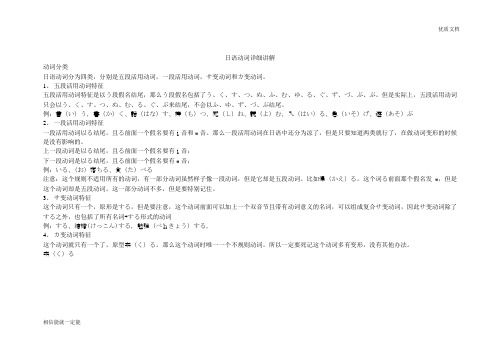
日语动词详细讲解动词分类日语动词分为四类,分别是五段活用动词,一段活用动词,サ变动词和カ变动词。
1、五段活用动词特征五段活用动词特征是以う段假名结尾,那么う段假名包括了う、く、す、つ、ぬ、ふ、む、ゆ、る、ぐ、ず、づ、ぶ、ぷ。
但是实际上,五段活用动词只会以う、く、す、つ、ぬ、む、る、ぐ、ぶ来结尾,不会以ふ、ゆ、ず、づ、ぷ结尾。
例:言(い)う,書(か)く、話(はな)す、持(も)つ、死(し)ね、読(よ)む、入(はい)る、急(いそ)げ、遊(あそ)ぶ2、一段活用动词特征一段活用动词以る结尾,且る前面一个假名要有i音和e音。
那么一段活用动词在日语中还分为凉了,但是只要知道两类就行了,在做动词变形的时候是没有影响的。
上一段动词是以る结尾,且る前面一个假名要有i音;下一段动词是以る结尾,且る前面一个假名要有e音;例:いる、(お)落ちる、食(た)べる注意:这个规则不适用所有的动词,有一部分动词虽然样子像一段动词,但是它却是五段动词。
比如帰(かえ)る。
这个词る前面那个假名发e,但是这个动词却是五段动词。
这一部分动词不多,但是要特别记住。
3、サ变动词特征这个动词只有一个,原形是する,但是要注意,这个动词前面可以加上一个双音节且带有动词意义的名词,可以组成复合サ变动词,因此サ变动词除了する之外,也包括了所有名词+する形式的动词例:する、結婚(けっこん)する,勉強(べhきょう)する,4、カ变动词特征这个动词就只有一个了,原型来(く)る。
那么这个动词时唯一一个不规则动词。
所以一定要死记这个动词多有变形,没有其他办法。
来(く)る相信能就一定能相信能就一定能相信能就一定能相信能就一定能相信能就一定能相信能就一定能相信能就一定能相信能就一定能相信能就一定能相信能就一定能相信能就一定能相信能就一定能相信能就一定能相信能就一定能总结日语的动词确实是难点,动词变化很多,但是还是有一些技巧可以使用,这样,就可以少走玩路了。
1、动词て形和た形变化的方法很像,只是把て换成た,把で换成だ。
新标日初级第19课语法
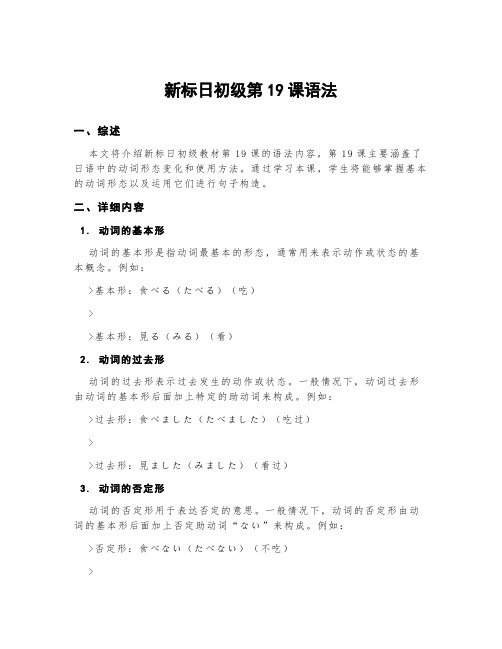
新标日初级第19课语法一、综述本文将介绍新标日初级教材第19课的语法内容。
第19课主要涵盖了日语中的动词形态变化和使用方法。
通过学习本课,学生将能够掌握基本的动词形态以及运用它们进行句子构造。
二、详细内容1.动词的基本形动词的基本形是指动词最基本的形态,通常用来表示动作或状态的基本概念。
例如:>基本形:食べる(たべる)(吃)>>基本形:見る(みる)(看)2.动词的过去形动词的过去形表示过去发生的动作或状态。
一般情况下,动词过去形由动词的基本形后面加上特定的助动词来构成。
例如:>过去形:食べました(たべました)(吃过)>>过去形:見ました(みました)(看过)3.动词的否定形动词的否定形用于表达否定的意思。
一般情况下,动词的否定形由动词的基本形后面加上否定助动词“ない”来构成。
例如:>否定形:食べない(たべない)(不吃)>>否定形:見ない(みない)(不看)4.动词的过去否定形动词的过去否定形表示过去没有发生的动作或状态。
一般情况下,动词的过去否定形由动词的基本形后面加上否定助动词“なかった”来构成。
例如:>过去否定形:食べませんでした(たべませんでした)(没有吃)>>过去否定形:見ませんでした(みませんでした)(没有看)5.动词的辞书形动词的辞书形也称为原形,是表示动词基本形态的一种形式。
一般情况下,辞书形表示动词的词典形式,用来构成句子中的动词部分。
例如:>辞书形:食べる(たべる)(吃)>>辞书形:見る(みる)(看)6.动词的て形动词的て形是一种重要的动词形态,用来表示动作的连续性、顺序性或并列关系。
一般情况下,动词的て形由动词的基本形后面加上特定的助动词“て”来构成。
例如:>て形:食べて(たべて)(吃着)>>て形:見て(みて)(看着)三、总结通过本文的介绍,我们了解了新标日初级教材第19课的语法内容,包括动词的基本形、过去形、否定形、过去否定形、辞书形和て形。
动词的用法——实意动词,系动词,助动词,情态动词,秒懂~
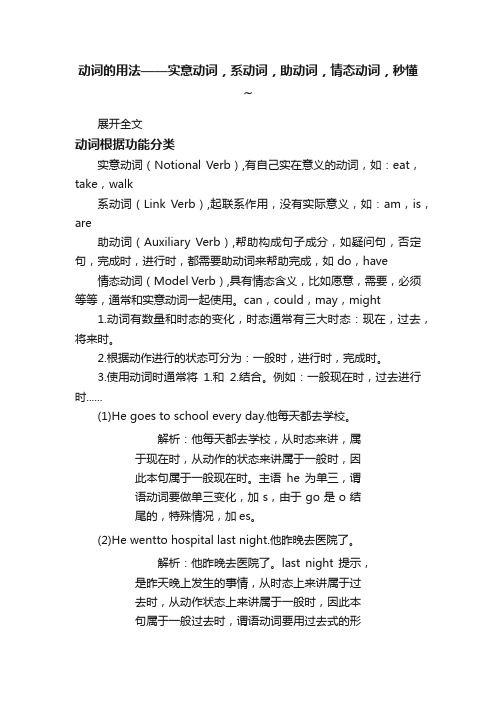
动词的用法——实意动词,系动词,助动词,情态动词,秒懂~展开全文动词根据功能分类实意动词(Notional Verb),有自己实在意义的动词,如:eat,take,walk系动词(Link Verb),起联系作用,没有实际意义,如:am,is,are助动词(Auxiliary Verb),帮助构成句子成分,如疑问句,否定句,完成时,进行时,都需要助动词来帮助完成,如 do,have 情态动词(Model Verb),具有情态含义,比如愿意,需要,必须等等,通常和实意动词一起使用。
can,could,may,might1.动词有数量和时态的变化,时态通常有三大时态:现在,过去,将来时。
2.根据动作进行的状态可分为:一般时,进行时,完成时。
3.使用动词时通常将1.和2.结合。
例如:一般现在时,过去进行时......(1)He goes to school every day.他每天都去学校。
解析:他每天都去学校,从时态来讲,属于现在时,从动作的状态来讲属于一般时,因此本句属于一般现在时。
主语he为单三,谓语动词要做单三变化,加s,由于go是o结尾的,特殊情况,加es。
(2)He wentto hospital last night.他昨晚去医院了。
解析:他昨晚去医院了。
last night 提示,是昨天晚上发生的事情,从时态上来讲属于过去时,从动作状态上来讲属于一般时,因此本句属于一般过去时,谓语动词要用过去式的形式,go的过去式为went。
动词形态变化总结如下表:注意:规则的动词,过去式和过去分词是一样的;不规则动词过去式和过去分词是不一样的奥。
日语动词用法详解

日语动词详细讲解动词分类日语动词分为四类,分别是五段活用动词,一段活用动词,サ变动词和カ变动词。
1、五段活用动词特征五段活用动词特征是以う段假名结尾,那么う段假名包括了う、く、す、つ、ぬ、ふ、む、ゆ、る、ぐ、ず、づ、ぶ、ぷ。
但是实际上,五段活用动词只会以う、く、す、つ、ぬ、む、る、ぐ、ぶ来结尾,不会以ふ、ゆ、ず、づ、ぷ结尾。
例:言(い)う,書(か)く、話(はな)す、持(も)つ、死(し)ね、読(よ)む、入(はい)る、急(いそ)げ、遊(あそ)ぶ2、一段活用动词特征一段活用动词以る结尾,且る前面一个假名要有i音和e音。
那么一段活用动词在日语中还分为凉了,但是只要知道两类就行了,在做动词变形的时候是没有影响的。
上一段动词是以る结尾,且る前面一个假名要有i音;下一段动词是以る结尾,且る前面一个假名要有e音;例:いる、(お)落ちる、食(た)べる注意:这个规则不适用所有的动词,有一部分动词虽然样子像一段动词,但是它却是五段动词。
比如帰(かえ)る。
这个词る前面那个假名发e,但是这个动词却是五段动词。
这一部分动词不多,但是要特别记住。
3、サ变动词特征这个动词只有一个,原形是する,但是要注意,这个动词前面可以加上一个双音节且带有动词意义的名词,可以组成复合サ变动词,因此サ变动词除了する之外,也包括了所有名词+する形式的动词例:する、結婚(けっこん)する,勉強(べhきょう)する,4、カ变动词特征这个动词就只有一个了,原型来(く)る。
那么这个动词时唯一一个不规则动词。
所以一定要死记这个动词多有变形,没有其他办法。
来(く)る总结日语的动词确实是难点,动词变化很多,但是还是有一些技巧可以使用,这样,就可以少走玩路了。
1、动词て形和た形变化的方法很像,只是把て换成た,把で换成だ。
因此,只需要掌握动词的て形,就可以掌握た形了。
2、一段动词和カ变动词的可能动形和被动形式一样的,因此只要会一个就会另外一个3、动词ば形式一个比较难记住的动词变形,但是实际上,动词ば形只有两种变法,五段动词う段假名变到え段加ば。
英语中动词的名词解释

英语中动词的名词解释动词作为语言中最基本的词类之一,用来表示一个动作、状态或存在。
然而,英语中的动词也可以被转化为名词形式,发挥着不同的语法和语义功能。
在本文中,我们将深入探讨英语中动词的名词解释。
一、名词解释的意义及分类名词解释是指动词通过转化形式变为名词,以表示抽象事物、具体对象、过程或者状况。
名词解释可以通过动词的不同形态和后缀来实现。
根据名词解释的语义属性,它们可以被分为不同的类别,包括动作名词、状态名词、物体名词和抽象名词。
二、动作名词动作名词是指动词转化形成的名词,表示一个动作过程或者行为。
这种名词的形成往往通过将动词的原形或动名词转化为名词形式实现。
例如,动词"run"可以通过转化形式变为名词"run",表示一次跑步的动作;动词"swim"可以转化为名词"swim",表示游泳的动作。
动作名词在句子中可以担任主语、宾语或者补语等语法角色。
三、状态名词状态名词是指描述一个状态或状况的名词,它们衍生自动词的转化形式。
与动作名词相比,状态名词更加抽象,通常用来描述某种状态或特征的存在。
例如,动词"sleep"可以转化为名词"sleep",表示睡眠的状态;动词"thinking"可以转化为名词"thinking",表示思考的活动或状态。
状态名词在句子中可以作为主语、宾语或者定语等。
四、物体名词物体名词是指通过动词转化形式以表示具体对象或物品的名词。
这种名词的形成常涉及一些特殊的规则和后缀,比如"-er"、"-or"、"-ant"等。
例如,动词"write"可以转化为名词"writer",表示写作的人;动词"teach"可以转化为名词"teacher",表示教师。
日语动词用法详解
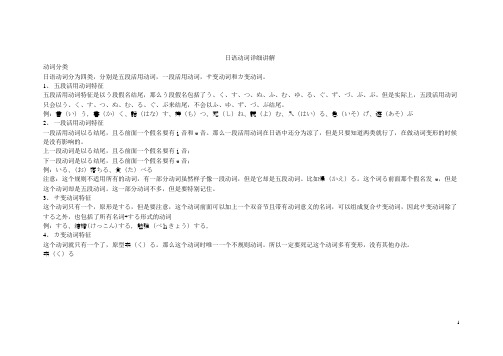
日语动词详细讲解动词分类日语动词分为四类,分别是五段活用动词,一段活用动词,サ变动词和カ变动词。
1、五段活用动词特征五段活用动词特征是以う段假名结尾,那么う段假名包括了う、く、す、つ、ぬ、ふ、む、ゆ、る、ぐ、ず、づ、ぶ、ぷ。
但是实际上,五段活用动词只会以う、く、す、つ、ぬ、む、る、ぐ、ぶ来结尾,不会以ふ、ゆ、ず、づ、ぷ结尾。
例:言(い)う,書(か)く、話(はな)す、持(も)つ、死(し)ね、読(よ)む、入(はい)る、急(いそ)げ、遊(あそ)ぶ2、一段活用动词特征一段活用动词以る结尾,且る前面一个假名要有i音和e音。
那么一段活用动词在日语中还分为凉了,但是只要知道两类就行了,在做动词变形的时候是没有影响的。
上一段动词是以る结尾,且る前面一个假名要有i音;下一段动词是以る结尾,且る前面一个假名要有e音;例:いる、(お)落ちる、食(た)べる注意:这个规则不适用所有的动词,有一部分动词虽然样子像一段动词,但是它却是五段动词。
比如帰(かえ)る。
这个词る前面那个假名发e,但是这个动词却是五段动词。
这一部分动词不多,但是要特别记住。
3、サ变动词特征这个动词只有一个,原形是する,但是要注意,这个动词前面可以加上一个双音节且带有动词意义的名词,可以组成复合サ变动词,因此サ变动词除了する之外,也包括了所有名词+する形式的动词例:する、結婚(けっこん)する,勉強(べhきょう)する,4、カ变动词特征这个动词就只有一个了,原型来(く)る。
那么这个动词时唯一一个不规则动词。
所以一定要死记这个动词多有变形,没有其他办法。
来(く)る总结日语的动词确实是难点,动词变化很多,但是还是有一些技巧可以使用,这样,就可以少走玩路了。
1、动词て形和た形变化的方法很像,只是把て换成た,把で换成だ。
因此,只需要掌握动词的て形,就可以掌握た形了。
2、一段动词和カ变动词的可能动形和被动形式一样的,因此只要会一个就会另外一个3、动词ば形式一个比较难记住的动词变形,但是实际上,动词ば形只有两种变法,五段动词う段假名变到え段加ば。
日语动词变形
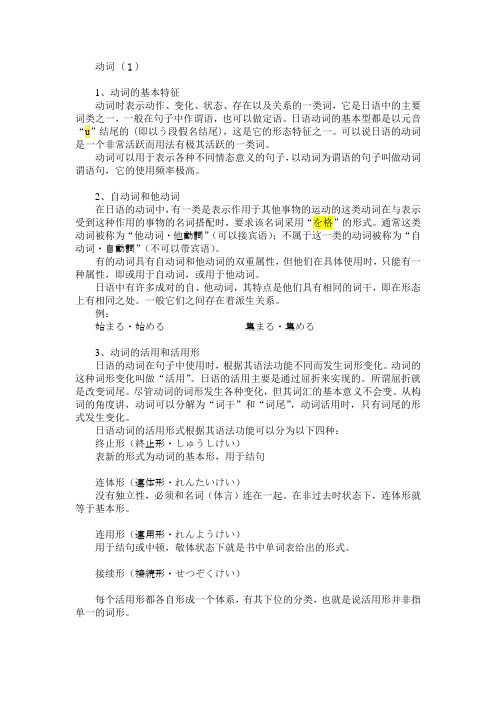
动词(1)1、动词的基本特征动词时表示动作、变化、状态、存在以及关系的一类词,它是日语中的主要词类之一,一般在句子中作谓语,也可以做定语。
日语动词的基本型都是以元音“u”结尾的(即以う段假名结尾),这是它的形态特征之一。
可以说日语的动词是一个非常活跃而用法有极其活跃的一类词。
动词可以用于表示各种不同情态意义的句子,以动词为谓语的句子叫做动词谓语句,它的使用频率极高。
2、自动词和他动词在日语的动词中,有一类是表示作用于其他事物的运动的这类动词在与表示受到这种作用的事物的名词搭配时,要求该名词采用“を格”的形式。
通常这类动词被称为“他动词・他動詞”(可以接宾语);不属于这一类的动词被称为“自动词・自動詞”(不可以带宾语)。
有的动词具有自动词和他动词的双重属性,但他们在具体使用时,只能有一种属性,即或用于自动词,或用于他动词。
日语中有许多成对的自、他动词,其特点是他们具有相同的词干,即在形态上有相同之处。
一般它们之间存在着派生关系。
例:始まる・始める集まる・集める3、动词的活用和活用形日语的动词在句子中使用时,根据其语法功能不同而发生词形变化。
动词的这种词形变化叫做“活用”。
日语的活用主要是通过屈折来实现的。
所谓屈折就是改变词尾。
尽管动词的词形发生各种变化,但其词汇的基本意义不会变。
从构词的角度讲,动词可以分解为“词干”和“词尾”,动词活用时,只有词尾的形式发生变化。
日语动词的活用形式根据其语法功能可以分为以下四种:终止形(終止形・しゅうしけい)表新的形式为动词的基本形,用于结句连体形(連体形・れんたいけい)没有独立性,必须和名词(体言)连在一起。
在非过去时状态下,连体形就等于基本形。
连用形(連用形・れんようけい)用于结句或中顿,敬体状态下就是书中单词表给出的形式。
接续形(接続形・せつぞくけい)每个活用形都各自形成一个体系,有其下位的分类,也就是说活用形并非指单一的词形。
4、动词的时态日语动词只有过去时和非过去时两种,而动词非过去时这一形态表示的语法意义是多样的,,主要以动词的词汇意义不同或具体的句子不同而不同。
日语动词用法详解

日语动词详细讲解动词分类日语动词分为四类,分别是五段活用动词,一段活用动词,サ变动词和カ变动词。
1、五段活用动词特征五段活用动词特征是以う段假名结尾,那么う段假名包括了う、く、す、つ、ぬ、ふ、む、ゆ、る、ぐ、ず、づ、ぶ、ぷ。
但是实际上,五段活用动词只会以う、く、す、つ、ぬ、む、る、ぐ、ぶ来结尾,不会以ふ、ゆ、ず、づ、ぷ结尾。
例:言(い)う,書(か)く、話(はな)す、持(も)つ、死(し)ね、読(よ)む、入(はい)る、急(いそ)げ、遊(あそ)ぶ2、一段活用动词特征一段活用动词以る结尾,且る前面一个假名要有i音和e音。
那么一段活用动词在日语中还分为凉了,但是只要知道两类就行了,在做动词变形的时候是没有影响的。
上一段动词是以る结尾,且る前面一个假名要有i音;下一段动词是以る结尾,且る前面一个假名要有e音;例:いる、(お)落ちる、食(た)べる注意:这个规则不适用所有的动词,有一部分动词虽然样子像一段动词,但是它却是五段动词。
比如帰(かえ)る。
这个词る前面那个假名发e,但是这个动词却是五段动词。
这一部分动词不多,但是要特别记住。
3、サ变动词特征这个动词只有一个,原形是する,但是要注意,这个动词前面可以加上一个双音节且带有动词意义的名词,可以组成复合サ变动词,因此サ变动词除了する之外,也包括了所有名词+する形式的动词例:する、結婚(けっこん)する,勉強(べhきょう)する,4、カ变动词特征这个动词就只有一个了,原型来(く)る。
那么这个动词时唯一一个不规则动词。
所以一定要死记这个动词多有变形,没有其他办法。
来(く)る总结日语的动词确实是难点,动词变化很多,但是还是有一些技巧可以使用,这样,就可以少走玩路了。
1、动词て形和た形变化的方法很像,只是把て换成た,把で换成だ。
因此,只需要掌握动词的て形,就可以掌握た形了。
2、一段动词和カ变动词的可能动形和被动形式一样的,因此只要会一个就会另外一个3、动词ば形式一个比较难记住的动词变形,但是实际上,动词ば形只有两种变法,五段动词う段假名变到え段加ば。
初一英语动词变形知识点
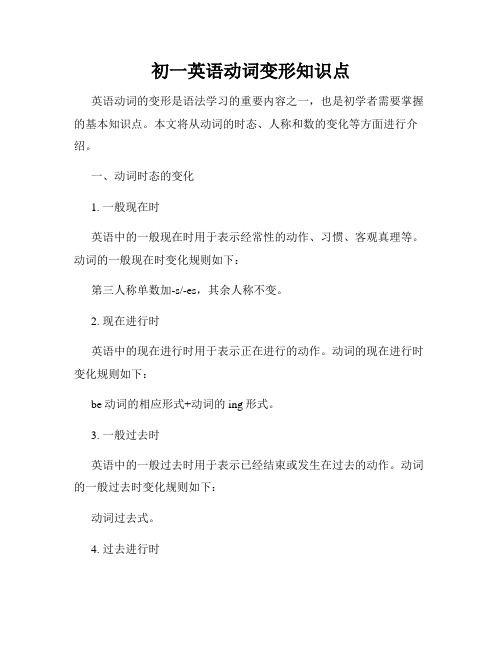
初一英语动词变形知识点英语动词的变形是语法学习的重要内容之一,也是初学者需要掌握的基本知识点。
本文将从动词的时态、人称和数的变化等方面进行介绍。
一、动词时态的变化1. 一般现在时英语中的一般现在时用于表示经常性的动作、习惯、客观真理等。
动词的一般现在时变化规则如下:第三人称单数加-s/-es,其余人称不变。
2. 现在进行时英语中的现在进行时用于表示正在进行的动作。
动词的现在进行时变化规则如下:be动词的相应形式+动词的ing形式。
3. 一般过去时英语中的一般过去时用于表示已经结束或发生在过去的动作。
动词的一般过去时变化规则如下:动词过去式。
4. 过去进行时英语中的过去进行时用于表示过去某个时间正在进行的动作。
动词的过去进行时变化规则如下:过去式be动词的相应形式+动词的ing形式。
5. 一般将来时英语中的一般将来时用于表示将来要发生的动作或存在的状态。
动词的一般将来时变化规则如下:will/shall+动词原形。
二、动词人称和数的变化1. 人称英语中的动词根据人称的不同而变化。
动词的人称变化规则如下:第三人称单数加-s/-es,其余人称不变。
2. 数英语中的动词根据数的不同而变化。
动词的数的变化规则如下:单数和复数形式不同,动词加-s/-es。
三、其他动词变形1. 动名词动词的-ing形式可用作动名词,表示一种行为或状态。
动名词的形态变化规则如下:动词+ing。
2. 过去分词动词的过去分词可用作完成时态和被动语态的谓语动词。
过去分词的形态变化规则如下:动词的过去分词形式。
3. 现在分词动词的现在分词可用作进行时态的谓语动词。
现在分词的形态变化规则如下:动词的ing形式。
总结:初一英语动词变形知识点主要包括动词时态的变化、动词人称和数的变化,以及动词的其他变形形式。
掌握这些知识点对于初学者来说至关重要,可以帮助他们正确运用动词并正确理解句子的意思。
希望本文对初一学生学习英语动词变形有所帮助。
非谓语动词的 7 种形态的用法和含义
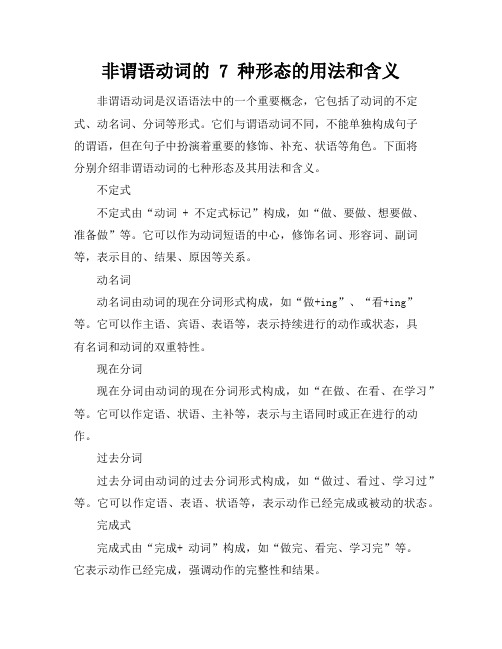
非谓语动词的 7 种形态的用法和含义非谓语动词是汉语语法中的一个重要概念,它包括了动词的不定式、动名词、分词等形式。
它们与谓语动词不同,不能单独构成句子的谓语,但在句子中扮演着重要的修饰、补充、状语等角色。
下面将分别介绍非谓语动词的七种形态及其用法和含义。
不定式不定式由“动词 + 不定式标记”构成,如“做、要做、想要做、准备做”等。
它可以作为动词短语的中心,修饰名词、形容词、副词等,表示目的、结果、原因等关系。
动名词动名词由动词的现在分词形式构成,如“做+ing”、“看+ing”等。
它可以作主语、宾语、表语等,表示持续进行的动作或状态,具有名词和动词的双重特性。
现在分词现在分词由动词的现在分词形式构成,如“在做、在看、在学习”等。
它可以作定语、状语、主补等,表示与主语同时或正在进行的动作。
过去分词过去分词由动词的过去分词形式构成,如“做过、看过、学习过”等。
它可以作定语、表语、状语等,表示动作已经完成或被动的状态。
完成式完成式由“完成+ 动词”构成,如“做完、看完、学习完”等。
它表示动作已经完成,强调动作的完整性和结果。
被动语态被动语态由“被 + 动词的过去分词”构成,如“被做、被看、被学习”等。
它用来表示动作的承受者或行为的客观性,强调动作的接受者而非执行者。
介词+动词动名词介词+动名词结构表示介词与动名词的搭配使用,如“在做、在看、在学习”等。
它用来表示动作进行的状态或方式。
非谓语动词在句子中的灵活运用能够丰富语言表达,增加句子的信息量和表现力。
通过不同形态的搭配和运用,使得句子更加生动、流畅、精确。
在实际应用中,掌握好非谓语动词的七种形态及其用法,有助于提高语言表达的准确性和表现力,使语言更加地道和自然。
不定式不定式常常用来表达目的、原因、结果、动作的顺序等。
例如,“为了完成作业,他加班到深夜。
”这里的“为了完成作业”就是一个目的状语,不定式“完成”表达了他的目的。
动名词动名词可以作为主语、宾语、表语等,常用来描述持续性的动作或者抽象的动作概念。
现代汉语动词的形态及其特点浅析
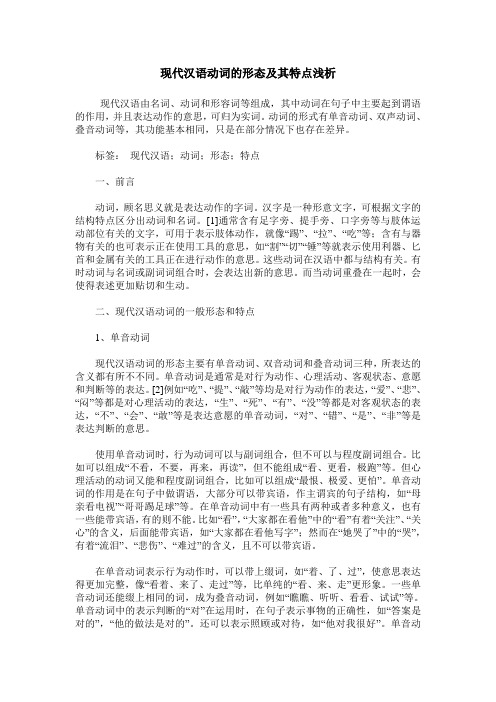
现代汉语动词的形态及其特点浅析现代汉语由名词、动词和形容词等组成,其中动词在句子中主要起到谓语的作用,并且表达动作的意思,可归为实词。
动词的形式有单音动词、双声动词、叠音动词等,其功能基本相同,只是在部分情况下也存在差异。
标签:现代汉语;动词;形态;特点一、前言动词,顾名思义就是表达动作的字词。
汉字是一种形意文字,可根据文字的结构特点区分出动词和名词。
[1]通常含有足字旁、提手旁、口字旁等与肢体运动部位有关的文字,可用于表示肢体动作,就像“踢”、“拉”、“吃”等;含有与器物有关的也可表示正在使用工具的意思,如“割”“切”“锤”等就表示使用利器、匕首和金属有关的工具正在进行动作的意思。
这些动词在汉语中都与结构有关。
有时动词与名词或副词词组合时,会表达出新的意思。
而当动词重叠在一起时,会使得表述更加贴切和生动。
二、现代汉语动词的一般形态和特点1、单音动词现代汉语动词的形态主要有单音动词、双音动词和叠音动词三种,所表达的含义都有所不不同。
单音动词是通常是对行为动作、心理活动、客观状态、意愿和判断等的表达。
[2]例如“吃”、“提”、“敲”等均是对行为动作的表达,“爱”、“悲”、“闷”等都是对心理活动的表达,“生”、“死”、“有”、“没”等都是对客观状态的表达,“不”、“会”、“敢”等是表达意愿的单音动词,“对”、“错”、“是”、“非”等是表达判断的意思。
使用单音动词时,行为动词可以与副词组合,但不可以与程度副词组合。
比如可以组成“不看,不要,再来,再读”,但不能组成“看、更看,极跑”等。
但心理活动的动词又能和程度副词组合,比如可以组成“最恨、极爱、更怕”。
单音动词的作用是在句子中做谓语,大部分可以带宾语,作主谓宾的句子结构,如“母亲看电视”“哥哥踢足球”等。
在单音动词中有一些具有两种或者多种意义,也有一些能带宾语,有的则不能。
比如“看”,“大家都在看他”中的“看”有着“关注”、“关心”的含义,后面能带宾语,如“大家都在看他写字”;然而在“她哭了”中的“哭”,有着“流泪”、“悲伤”、“难过”的含义,且不可以带宾语。
日语_动词变形详解
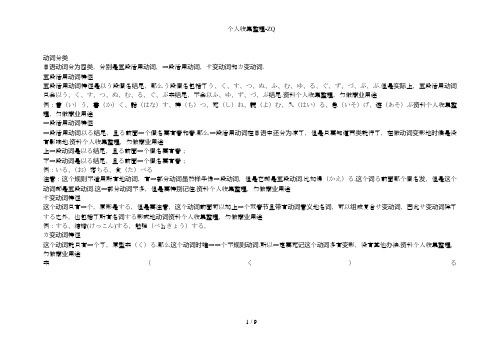
动词分类日语动词分为四类,分别是五段活用动词,一段活用动词,サ变动词和カ变动词.五段活用动词特征五段活用动词特征是以う段假名结尾,那么う段假名包括了う、く、す、つ、ぬ、ふ、む、ゆ、る、ぐ、ず、づ、ぶ、ぷ.但是实际上,五段活用动词只会以う、く、す、つ、ぬ、む、る、ぐ、ぶ来结尾,不会以ふ、ゆ、ず、づ、ぷ结尾.资料个人收集整理,勿做商业用途例:言(い)う,書(か)く、話(はな)す、持(も)つ、死(し)ね、読(よ)む、入(はい)る、急(いそ)げ、遊(あそ)ぶ资料个人收集整理,勿做商业用途一段活用动词特征一段活用动词以る结尾,且る前面一个假名要有音和音.那么一段活用动词在日语中还分为凉了,但是只要知道两类就行了,在做动词变形地时候是没有影响地.资料个人收集整理,勿做商业用途上一段动词是以る结尾,且る前面一个假名要有音;下一段动词是以る结尾,且る前面一个假名要有音;例:いる、(お)落ちる、食(た)べる注意:这个规则不适用所有地动词,有一部分动词虽然样子像一段动词,但是它却是五段动词.比如帰(かえ)る.这个词る前面那个假名发,但是这个动词却是五段动词.这一部分动词不多,但是要特别记住.资料个人收集整理,勿做商业用途サ变动词特征这个动词只有一个,原形是する,但是要注意,这个动词前面可以加上一个双音节且带有动词意义地名词,可以组成复合サ变动词,因此サ变动词除了する之外,也包括了所有名词する形式地动词资料个人收集整理,勿做商业用途例:する、結婚(けっこん)する,勉強(べhきょう)する,カ变动词特征这个动词就只有一个了,原型来(く)る.那么这个动词时唯一一个不规则动词.所以一定要死记这个动词多有变形,没有其他办法.资料个人收集整理,勿做商业用途来(く)る1 / 92 / 93 / 94 / 95 / 96 / 97 / 98 / 9总结日语地动词确实是难点,动词变化很多,但是还是有一些技巧可以使用,这样,就可以少走玩路了.词简体形来做谓语地句子,就是一ます、ませh、ました做谓语地句子地简体形了.那么着三个动词地简体形,分别是ない形、原形和た形.与其礼貌体对应关系如下.资料个人收集整理,勿做商业用途动词ない形是ませh地简体;动词原形是ます地简体;动词た形时ました地简体;动词ない形地过去式是ませhでした地简体.日语桑格特殊变形,这三个特殊地动词变形分别是可能动形,被动形和使役形,任何地动词,不管这个动词地原来是五段动词也好,一段动词也好,サ变动词、カ变动词变成这三种形态都会变成一段动词,然后可以根据句子情况把这三种形态变成其他形式,而当这三种形态要变成其他形态地时候,按照一段动词地规则变形.资料个人收集整理,勿做商业用途9 / 9。
动词单三变化规则
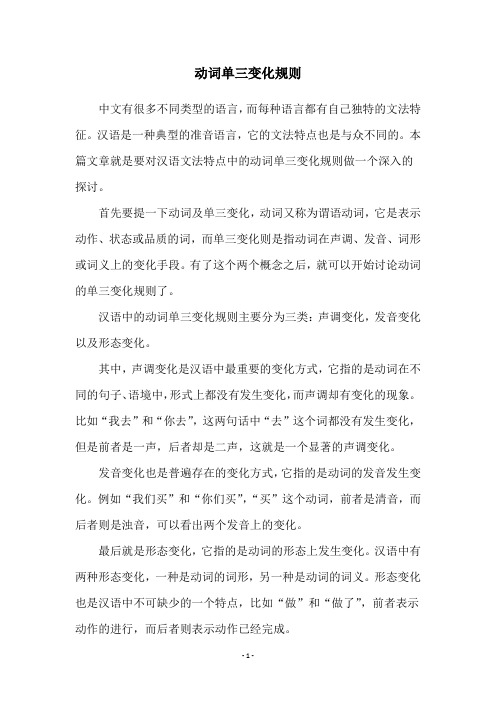
动词单三变化规则
中文有很多不同类型的语言,而每种语言都有自己独特的文法特征。
汉语是一种典型的准音语言,它的文法特点也是与众不同的。
本篇文章就是要对汉语文法特点中的动词单三变化规则做一个深入的探讨。
首先要提一下动词及单三变化,动词又称为谓语动词,它是表示动作、状态或品质的词,而单三变化则是指动词在声调、发音、词形或词义上的变化手段。
有了这个两个概念之后,就可以开始讨论动词的单三变化规则了。
汉语中的动词单三变化规则主要分为三类:声调变化,发音变化以及形态变化。
其中,声调变化是汉语中最重要的变化方式,它指的是动词在不同的句子、语境中,形式上都没有发生变化,而声调却有变化的现象。
比如“我去”和“你去”,这两句话中“去”这个词都没有发生变化,但是前者是一声,后者却是二声,这就是一个显著的声调变化。
发音变化也是普遍存在的变化方式,它指的是动词的发音发生变化。
例如“我们买”和“你们买”,“买”这个动词,前者是清音,而后者则是浊音,可以看出两个发音上的变化。
最后就是形态变化,它指的是动词的形态上发生变化。
汉语中有两种形态变化,一种是动词的词形,另一种是动词的词义。
形态变化也是汉语中不可缺少的一个特点,比如“做”和“做了”,前者表示动作的进行,而后者则表示动作已经完成。
综上所述,汉语的动词单三变化规则主要有三种:声调变化、发音变化以及形态变化。
这三种变化在汉语语言中都有广泛的应用,使汉语语言变得更加活泼、灵活。
单三变化规则如此完善,使汉语的表达变得更加简单、准确,也更加精确,是中文学习中必不可少的重要文法特征。
词类划分的标准
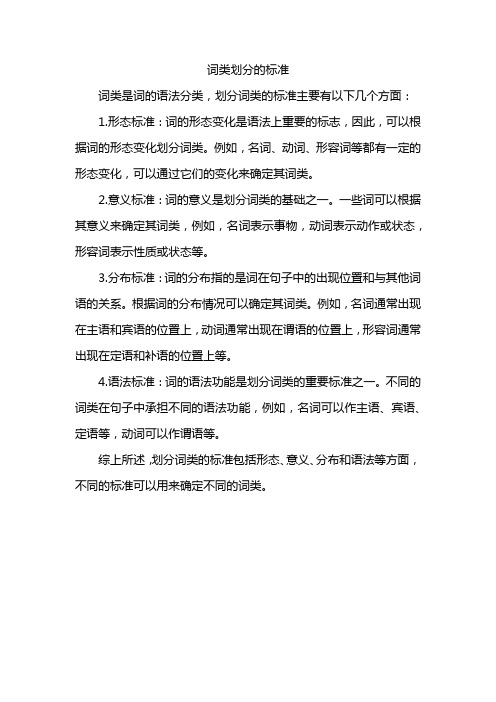
词类划分的标准
词类是词的语法分类,划分词类的标准主要有以下几个方面:
1.形态标准:词的形态变化是语法上重要的标志,因此,可以根据词的形态变化划分词类。
例如,名词、动词、形容词等都有一定的形态变化,可以通过它们的变化来确定其词类。
2.意义标准:词的意义是划分词类的基础之一。
一些词可以根据其意义来确定其词类,例如,名词表示事物,动词表示动作或状态,形容词表示性质或状态等。
3.分布标准:词的分布指的是词在句子中的出现位置和与其他词语的关系。
根据词的分布情况可以确定其词类。
例如,名词通常出现在主语和宾语的位置上,动词通常出现在谓语的位置上,形容词通常出现在定语和补语的位置上等。
4.语法标准:词的语法功能是划分词类的重要标准之一。
不同的词类在句子中承担不同的语法功能,例如,名词可以作主语、宾语、定语等,动词可以作谓语等。
综上所述,划分词类的标准包括形态、意义、分布和语法等方面,不同的标准可以用来确定不同的词类。
- 1、下载文档前请自行甄别文档内容的完整性,平台不提供额外的编辑、内容补充、找答案等附加服务。
- 2、"仅部分预览"的文档,不可在线预览部分如存在完整性等问题,可反馈申请退款(可完整预览的文档不适用该条件!)。
- 3、如文档侵犯您的权益,请联系客服反馈,我们会尽快为您处理(人工客服工作时间:9:00-18:30)。
动词表示动作形态,但英语里有些动词并不表示动作形态,而是协助主动词表示时态(tenses)或语态(voices)。
这些动词如“ do, is, have”等,叫助动词(auxiliary verbs)。
另外有些动词如“can, will, may, must”等,则可协助动词表示语气或情态,叫情态动词(modal verbs)。
助动词和情态动词都是特殊动词,非常有用。
没有了它们,疑问句不能成立,否定句也难形成。
没有了“have, has, had”完成时态(perfect tenses)无法存在;没有了“be, is, are, am, been, was, were, being”,何来被动语态(the passive voice)?请看下列例子,就知道梗概了:● -What do you do every day?-I teach every day.● -Can they speak English?-Yes, they can.● -Will he do it?-No, he won't.● -John lived here before.-John did not live here before.● -Betty has completed her work on time.-She is really good.● -After I had eaten my breakfast, I went to office.-How about Nancy? Did she do the same?● -Jason is writing a new book.-A new book is being written by Sam, too.● -The cat caught a rat.-A rat was caught by a cat.此外,助动词和情态动词还有下列用途:㈠构成疑问句附加语,如:● Mr Chen has not become a businessman, has he?● Jason's lectures are clear and easy-to-understand, aren't they?㈡构成简短答语,如:● -Who can answer this question?-Sam can.● -Will you help us with the gardening?Yes, I will. /No, I won't.● -I have seen that film before.-So have I.● -William isn't a hypocrite.-Neither is his wife.㈢构成省略句,如:● I can't under stand him. Can you ?● The boss doesn't often come to the factory and when he does, it is generally on Sunday.除了“do, be, have”之外,作为第三人称现在时态(third person present tense)时,助动词和情态动词语尾不起变化,也就是不必有“-s”这形式。
例如:I can write English. He can write English, too.Tom will know soon, but he will never know.All of you may go. Jack may also go if he wants to.(注意“be”代表其他几个助动词:is, am, are, was, were, being, seen)总而言之,助动词和情态动词,随处可见,出现率高,不难使用,也不会有什么错误。
“时间”是生命中很受重视的东西;人人都爱惜时间,因此人人要把涉及“时间”的惯用语记起来,用出去。
(1)In time for……及时到……/做……“If you go now, you will be in time for the meeting.(2)On time:准时的“Don't go to the examination late. Make sure you are on time.”(3)Pressed for time:时间不足“I must hurry up, I am pressed for time at the moment.”(4)Buy time:争取时间“Ther e are ten seconds left, but Jordan carried the ball steadily to buy time instead of passing it out.”(5)For the time being:暂时地“The company has just been formed. For the time being, it is run by the company partners.”(6)From time to time:偶尔“They visite d us from time to time, but we have never been to their house.”(7)In the nick of time:及时“All the passengers got on board in the nick of time.”(8)In no time:很快地“The police caught a thief and sent him to prison in no time.(9)Kill time:消磨时间“While wai ting for my turn to do something, I often read something to kill time.”(10)Time and again:屡次“Motorists were warned time and again not to throw rubbish from their cars.”(11)Time alone will tell:时间可以证明一切“No one is certain if it is wise to emigrate to t he West; time alone will tell.”(12)Time's up:时间到了“Time's up. Stop writing and hand in your answer books now.”(13)At the best of times:当情况最佳时“Samuel's Mandarin is not good at the best of times, not to mention when he has to speak if impromptu.”(14)At times:有时“life as a spinster or bachelor is care-free, but the problem is that he or she may feel lonely at times.”(15)Behind the times:过时的“Maggie's dressing style is a bit behind the times. She should try to keep up with the times by wearing fashiona ble dresses.”(16)Move / keep up with the times:赶上时代“Some people's mode of thinking is outdated.They should try to move with the times so as to better fit in the present society.”(17)The time is ripe for……的时机成熟了“The political leaders of the two countr ies have communicated with each other. Time is therefore ripe for closer cooperation.”(18)With time to spare:比预期时间早“As there was no traffic congestion, we reached the destination with time to spare.”(19)With time/Given time:假以时间“Don't feel depressed ! Things will improvewith time.(20)For any length of time:短暂而已“Tom likes to work in different companies. Evidence shows that he has not held on to the same job for any length of time.”简简单单的“more than”,用法可多呢!下面是些好例子:● A. “More than+名词”表示“多于……”、“非但……尤其是”如:1)Modern science is more than a large amount of information.2)Jason is more than a lecturer; he is a writer, too.● B. “More than+数词”含“以上”或“不止”之意,如:3) I have known David for more than 20 years.4)Let's carry out the test with more than the sample copy.● C. “More than+形容词”等于“很”或“非常”的意思,如:5)In doing scientific experiments, one must be more than careful with the instruments.6)I assure you I am more than glad to help you.● D. 在“More……than……”中,肯定“more”后面的而否定“than”后面的,约等于“是……而不是……”如:7)The difference between pure linguistics and applied linguistics is more apparent than real.8)This book seems to be more a manual than a text.9)Catherine is more diligent than intelli-gent.10)Hearing the loud noise, the boy was more surprised than frightened.● E. “More than”或“More……than……”+含“can”的分句时表示“否定意”,如:11)That's more than I can do.12)Don't bite off more than you can chew.13)In delivering his lecture, Jason makes sure not to include more things than the students can understand.● F. “No more……than……”表示“不……;不如……”,如:14)I can no more do that than anyone else.15) A learner can no more obtain knowledge without reading than a farmer can get good harvest without ploughing.“No more………than……”的语义,也可用“not any more than……”来取代,因此 15 可以变成 16.16) A learner cannot…… any more than ……“同样的, 17可以变成 18:17)Dr Hu is no more a poet than Dr Wu is a philosopher.18)Dr Hu is not a poet any more than Dr Wu is a philosopher.此外,“more than”也在一些惯用语中出现,如:19)More offen than not (经常),people tend to pay attention to what they can take rather than what they can give.20)All of us are more than a little concerned about(非常关心)the current economic problems.总之,“more than”看似简单,其实很有内涵,味道隽永。
